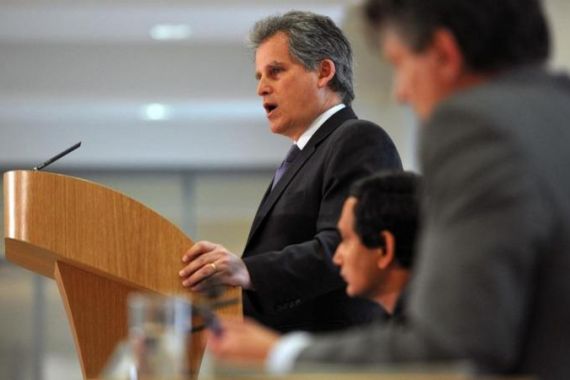IMF says Britain ‘a long way’ from recovery
Report calls for government to boost infrastructure spending in order to accelerate growth and offset austerity.

The International Monetary Fund has said that Britain was a long way from a “sustainable recovery”, and called for the government to boost infrastructure spending in order to accelerate economic growth and offset austerity.
The IMF on Wednesday called for British Finance Minister George Osborne to ease the coalition government’s austerity drive, despite the minister’s pledge last week to stick by his deficit-slashing measures.
Keep reading
list of 4 itemsBiden labels Japan and India ‘xenophobic’ along with China and Russia
KFC Malaysia temporarily closes outlets amid Gaza boycott
Turkey says it halts trade with Israel over Gaza aid access
“The key risk is that persistent slow growth could permanently damage medium-term growth prospects,” the IMF said.
The Conservative-Liberal Democrat government insists that its austerity measures are needed to drive down the record budget deficit inherited from the previous Labour administration in 2010.
However, David Lipton, the IMF’s First Deputy Managing Director, said during a news conference in London that ongoing austerity would hurt growth.
“What is important now is not to make a mistake today and presume that all will be well with the economy some years from now. I think it’s important to get started on infrastructure projects that will support the economy,” he said.
Deficit-reduction plan
As well as more spending on roads, housing and schools, lower corporation tax and incentives for firms to issue shares would help, Lipton added.
As Osborne sat watching, Lipton stressed he was not calling on the government to abandon the deficit-reduction plan that was a centrepiece of its 2010 election campaign, and which it has clung to even as the eurozone crisis buffets Britain’s economy.
Osborne, speaking at the conference, agreed with the need to prioritise infrastructure investment “where we can”.
The IMF expressed concern that a scheme to boost the housing sector might simply push up prices and called for a “clear strategy” on returning state-controlled Royal Bank of Scotland and Lloyds Banking Group to private ownership.
The British economy shrank by 0.3 percent in the final three months of last year, hit by state austerity and ongoing fallout from the eurozone debt crisis.
However, it grew by 0.3 percent in the first quarter of 2013, according to preliminary estimates, leaving the economy essentially flat over the past six months.